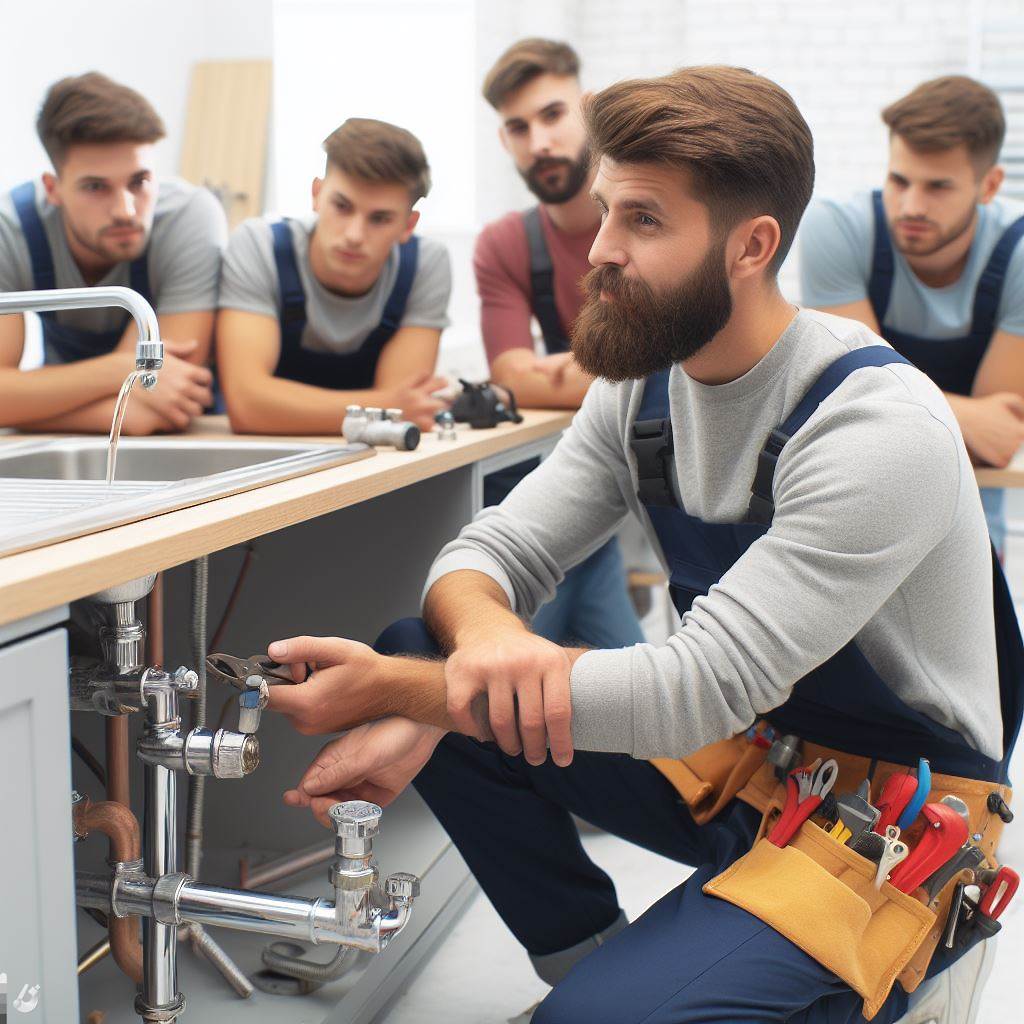Introduction
In delving into the future of plumbing in the UK, we embark on a dynamic exploration encompassing trends, innovations, and challenges.
Plumbing stands as the indispensable backbone of the nation’s infrastructure, playing a critical role in ensuring water supply, sanitation, and the adoption of sustainable practices.
As we anticipate the evolving landscape, this section unfolds insights into the trajectory of plumbing in the United Kingdom.
It is a journey that not only acknowledges the historical significance of plumbing but also peers into the future, where advancements and adaptations will shape the role of plumbing in sustaining the nation’s vital infrastructure.
This exploration goes beyond the pipes and fixtures, aiming to provide a comprehensive understanding of the forces that will mold the future of plumbing in the UK.
Current State of Plumbing in the UK
Demand for plumbing services
- The demand for plumbing services in the UK is high due to the increasing population.
- The construction industry has also played a significant role in creating a demand for plumbing services.
- Homeowners and businesses constantly require plumbing services for repairs and installations.
- Plumbing services are essential for maintaining a safe and hygienic environment in residential and commercial buildings.
- The demand for emergency plumbing services has also been on the rise in recent years.
Challenges faced by plumbers
- One of the challenges faced by plumbers in the UK is the availability of skilled professionals.
- The plumbing industry often struggles with a shortage of trained plumbers to meet the increasing demand.
- Plumbers also face the challenge of dealing with complex plumbing systems and equipment.
- Another challenge is the evolving technology in plumbing, requiring continuous learning and updating of skills.
- Plumbers often face time constraints in completing projects, leading to stress and potential issues.
Skills and qualifications required for plumbing
- To become a plumber in the UK, individuals need to acquire the necessary qualifications.
- Basic plumbing qualifications include Level 2 and Level 3 NVQ diplomas in plumbing and heating.
- Plumbers are required to have good problem-solving skills to identify and fix plumbing issues.
- They need to possess knowledge of plumbing regulations and building codes to ensure compliance.
- Good communication skills are essential for providing excellent customer service and understanding clients’ needs.
The demand for plumbing services in the UK is high, with an increasing population and construction activities contributing to the need.
However, plumbers face challenges such as skill shortages and dealing with complex plumbing systems.
Acquiring the necessary qualifications and developing essential skills is crucial for a successful career in plumbing.
Continuous learning and keeping up with technological advancements are also necessary to thrive in the plumbing industry.
Read: UK Plumber Training: What You Need to Know
Technological Advancements and Plumbing
Introduction to new plumbing technologies
- The plumbing industry is experiencing significant advancements in technology.
- New plumbing technologies are revolutionizing the way plumbing systems function.
- These technologies aim to improve efficiency, reduce water wastage, and enhance convenience.
- One such technology is the introduction of smart devices in plumbing systems.
- These devices can monitor and control various aspects of plumbing, making it more intelligent.
- One example is the use of smart toilets with built-in sensors and automated functions.
- Another technology is the development of advanced water purification and filtration systems.
Integration of smart devices in plumbing systems
- Smart devices are becoming increasingly prevalent in modern plumbing systems.
- These devices, such as smart faucets and showerheads, offer various benefits to homeowners.
- They have the ability to regulate water flow and temperature, reducing water consumption.
- Smart devices also provide real-time data on water usage, helping homeowners save on utility bills.
- Integration of smart devices in plumbing systems enhances overall efficiency and convenience.
- For example, smart leak detection systems can identify and alert homeowners of potential water leaks.
- Homeowners can remotely control and monitor their plumbing systems through smartphone apps.
Impact of technology on the plumbing industry
- Technology has had a profound impact on the plumbing industry.
- Plumbers now need to stay updated with the latest technological advancements.
- They must have knowledge and expertise in installing and repairing technologically advanced plumbing systems.
- Technology has also opened up new opportunities for specialized plumbing services.
- With the integration of smart devices, plumbing systems are becoming more complex.
- This complexity requires plumbers who are well-versed in both traditional and advanced plumbing techniques.
- The plumbing industry is witnessing a shift towards more sustainable and eco-friendly practices.
- Technological advancements have facilitated the development of water-efficient fixtures and systems.
- These advancements contribute to conserving water resources and reducing environmental impact.
Therefore, technological advancements have revolutionized the plumbing industry in the UK.
The introduction of new plumbing technologies and integration of smart devices in plumbing systems have brought about numerous benefits.
These technologies improve efficiency, conserve water, and enhance convenience for homeowners.
However, these advancements also require plumbers to adapt and stay updated with the latest technologies to provide effective services.
The plumbing industry is experiencing a transformation towards sustainability and eco-friendly practices, aided by technological innovations.
Personalized UK Career Consulting
Receive tailored career guidance designed just for you. Get actionable steps and expert support to boost your career in 1-3 days. Take control of your career now.
Get StartedThe future of plumbing in the UK looks promising with continued advancements in technology.
Read: Balancing Work-Life as a UK Electrician

Environmental Factors and Plumbing
Growing awareness of sustainable practices
In recent years, there has been a significant increase in the awareness of sustainable practices among individuals and organizations.
People are becoming more conscious of the impact their actions have on the environment and are actively seeking ways to minimize their carbon footprint.
This growing awareness extends to plumbing and the role it plays in conserving water and promoting sustainability.
People are realizing that even small plumbing changes can have a significant impact on water consumption and energy usage.
Role of plumbing in water conservation
Plumbing systems play a crucial role in water conservation efforts.
From efficient faucets and toilets to rainwater harvesting systems, there are several ways in which plumbing can help conserve water.
Installing water-efficient fixtures such as low-flow toilets and showerheads can significantly reduce water usage without compromising on performance.
These fixtures are designed to use less water while still providing adequate pressure and functionality.
Moreover, leak detection and repair can also contribute to water conservation.
Even minor leaks can waste a significant amount of water over time.
Regular maintenance and timely repairs can prevent water wastage and ensure efficient water usage.
Government initiatives to promote eco-friendly plumbing
Recognizing the importance of eco-friendly plumbing practices, governments around the world, including the UK, have implemented various initiatives to incentivize sustainable plumbing.
Your Dream Job Starts with a Perfect CV
Get a tailored CV and cover letter that captures your unique strengths and stands out in your industry. Let us help you make an unforgettable first impression.
Get StartedIn the UK, the Water Efficient Product Labelling Scheme is one such initiative.
This voluntary scheme allows manufacturers to label their products with a water efficiency rating, making it easier for consumers to choose products that use less water.
Additionally, the UK government has introduced regulations requiring new buildings to meet certain water efficiency standards.
This includes the installation of water-saving fixtures and rainwater harvesting systems, among other measures.
Furthermore, financial incentives such as grants and tax credits are provided to individuals and businesses that adopt eco-friendly plumbing practices.
These incentives encourage people to make sustainable choices and invest in water-efficient plumbing systems.
Most importantly, environmental factors are playing a significant role in shaping the future of plumbing in the UK.
The growing awareness of sustainable practices has led to a greater emphasis on water conservation and eco-friendly plumbing.
By incorporating water-efficient fixtures and systems, individuals and organizations can make a tangible difference in reducing water consumption and promoting sustainability.
Government initiatives further support these efforts by providing incentives and regulations that encourage the adoption of eco-friendly plumbing practices.
As we move towards a more environmentally conscious future, it is essential for individuals, businesses, and governments to continue prioritizing sustainable plumbing practices.
Only through collective efforts can we ensure a greener and more sustainable future for the UK and the planet as a whole.
Read: The Salary Range of UK Mechanics in 2024
Future Trends in Plumbing
Emergence of Green Plumbing Practices
- Green plumbing practices are becoming increasingly popular due to their positive impact on the environment.
- These practices involve the use of sustainable materials and techniques to conserve water and promote energy efficiency.
- Water-saving fixtures such as low-flow toilets and faucets are being installed to reduce water consumption.
- Gray water systems are being implemented to recycle and reuse water for non-potable purposes like irrigation.
- Rainwater harvesting systems are also gaining popularity to collect and use rainwater for various plumbing needs.
- The adoption of green plumbing practices not only benefits the environment but also helps homeowners save on utility bills.
Expansion of Smart Plumbing Systems
- Smart plumbing systems are revolutionizing the way plumbing is done and managed.
- These systems utilize advanced technology, such as IoT (Internet of Things), sensors, and automation, to enhance efficiency and convenience.
- Leak detection sensors are being installed to identify and prevent water leaks, saving homeowners from potential damage and costly repairs.
- Smart meters are being used to monitor water usage in real-time, allowing homeowners to track their consumption and identify areas for improvement.
- Remote-controlled valves enable homeowners to control their plumbing systems from anywhere, providing convenience and control.
- The expansion of smart plumbing systems not only improves the overall functionality but also increases the longevity of plumbing infrastructure.
Integration of Renewable Energy Sources in Plumbing
- Plumbing systems are now being designed to incorporate renewable energy sources for heating and powering water-related processes.
- Solar thermal systems are being integrated to harness the energy from the sun for heating water.
- Heat pump technology is being used to extract heat from the surrounding environment and efficiently heat water.
- Geothermal systems utilize the Earth’s natural heat to warm water, reducing the reliance on traditional heating methods.
- Efficient insulation is being applied to pipes and tanks to minimize heat loss and improve energy efficiency.
- The integration of renewable energy sources in plumbing not only reduces carbon emissions but also lowers energy costs for homeowners.
In essence, the future of plumbing in the UK will witness significant advancements in green practices, smart systems, and the integration of renewable energy sources.
Optimize Your LinkedIn for Success
Boost your LinkedIn profile with a professional bio, keyword-rich headline, and strategic recommendations that attract recruiters. Stand out from the crowd and get noticed.
Optimize NowThese trends will not only benefit the environment but also provide homeowners with efficient, cost-effective, and sustainable plumbing solutions.
Embracing these future trends will play a crucial role in creating a greener and more technologically advanced plumbing industry in the UK.
Read: UK Electrical Safety Standards Explained
Job Opportunities and Career Prospects in Plumbing
Increasing demand for skilled plumbers
- The plumbing industry in the UK is experiencing a surge in demand for skilled plumbers.
- With the aging infrastructure and growing population, there is a constant need for plumbing services.
- The increasing demand for eco-friendly and sustainable plumbing solutions also adds to the job opportunities.
- Skilled plumbers who can install and maintain energy-efficient systems are highly sought after.
- As more people become aware of water conservation, plumbers who specialize in eco-friendly practices will be in high demand.
Job market outlook for plumbers
- The job market for plumbers in the UK is projected to grow steadily in the coming years.
- Plumbers can find employment in various sectors, including residential, commercial, and industrial.
- The construction industry, in particular, offers a significant number of job opportunities for plumbers.
- With the increasing focus on green building practices, plumbers who are knowledgeable about sustainable plumbing systems will have an edge in the job market.
- The rise of smart home technology also creates new job prospects for plumbers who can integrate plumbing systems with these technologies.
Training and education options for aspiring plumbers
- To pursue a career in plumbing, aspiring plumbers can choose from several training and education options.
- Vocational training programs offer hands-on training and practical skills development for aspiring plumbers.
- These programs typically last for a few months to a year, depending on the level of certification desired.
- Some vocational training programs also offer apprenticeships, which allow aspiring plumbers to gain experience while learning from experienced professionals.
- Alternatively, individuals can enroll in plumbing courses offered by technical colleges or trade schools.
- These courses provide a comprehensive understanding of plumbing principles, codes, and regulations.
- After completing training or education, aspiring plumbers can obtain relevant certifications to enhance their job prospects.
- Certifications from recognized industry bodies, such as the Chartered Institute of Plumbing and Heating Engineering, are highly valued by employers.
- Continuous professional development is also essential for plumbers to keep up with the latest advancements in plumbing technology.
In short, job opportunities and career prospects in plumbing are on the rise in the UK.
The increasing demand for skilled plumbers, positive job market outlook, and various training and education options make it an attractive career path.
Aspiring plumbers can seize the opportunities in this growing industry and contribute to creating efficient and sustainable plumbing systems for the future.
Conclusion
Recap of key points discussed
- The future of plumbing in the UK is influenced by several factors such as technology and sustainability.
- Smart plumbing systems and eco-friendly practices are becoming more popular.
- The demand for skilled plumbers is increasing, offering opportunities for career growth.
Importance of adapting to the future of plumbing in the UK
- Adapting to new technologies and practices is crucial to stay relevant in the plumbing industry.
- Embracing eco-friendly solutions and staying updated with industry trends can attract more customers.
- Keeping up with advancements in plumbing systems can enhance efficiency and save costs in the long run.
Encouragement for readers to discover more about the topic
- The future of plumbing in the UK is exciting and constantly evolving.
- By further exploring this topic, readers can gain valuable insights and stay ahead in the industry.
- Educating oneself about emerging trends and technologies can open up new opportunities and enhance professional growth.
The future of plumbing in the UK presents both challenges and opportunities.
Adapting to new technologies, embracing eco-friendly practices, and staying updated with industry trends are vital for success.
By further exploring this topic, readers can gain valuable insights and position themselves for a successful future in the plumbing industry.
[E-Book for Sale]
500 Cutting-Edge Tech Startup Ideas for 2024 & 2025: Innovate, Create, Dominate
$19.99 • 500 Tech Startup Ideas • 62 pages
You will get inspired with 500 innovative tech startup ideas for 2024 and 2025, complete with concise descriptions to help you kickstart your entrepreneurial journey in AI, Blockchain, IoT, Fintech, and AR/VR.




